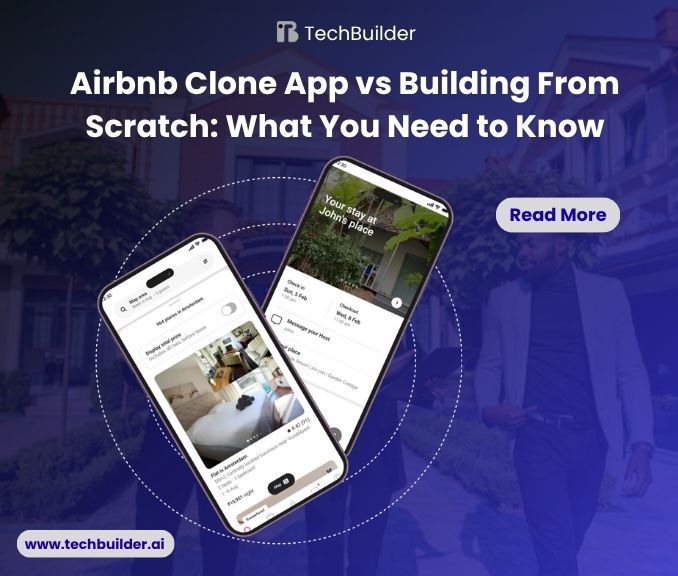The holiday rental sector is thriving as a result of changing travel trends and the popularity of companies – like Airbnb. Business owners must make a critical decision – use an Airbnb Clone App or build a custom vacation rental website from the bottom up.
The vacation rental sector is expected to be worth USD 104.62 billion in 2025 and USD 131.16 billion by 2030 – indicating that the business is poised for expansion.
So, which strategy is best suited to your business goals? In this post, we’ll go over the advantages and disadvantages of both alternatives – as well as the cost and timeline, to help you make an informed selection.
Looking To Establish Your Airbnb-Like Business? Start With Techbuilder’s Airbnb Clone App!
What is an Airbnb Clone App?
An Airbnb Clone App is a ready-to-use software product that replicates the fundamental features and functionalities of Airbnb. These apps have mandatory modules such as user sign-up, property listings, search and filters, bookings, in-app messaging, payment gateways, reviews, and admin dashboards, all wrapped in a launch-ready platform.
With more than 8 million active listings globally as of 2023, Airbnb provides users with a diverse selection of lodging options to suit every budget and preference.
The concept of a clone app is to enable businesses to save time and money by taking a tried-and-tested architecture that can be branded and customized based on their individual vision. Rather than starting from scratch – you have a basis that encompasses:
- Guests and host frontend (web and mobile)
- Admin panel and user management backend
- Built-in payment gateways – e.g. Stripe, PayPal
- Geo-location and map search
- Host dashboards, booking calendar, and analytics
Such apps are usually modular and scalable, a good fit for entrepreneurs, agencies – as well as enterprise-level startups that want to immediately enter the vacation rental niche.
Benefits of Using an Airbnb Clone App
There are many benefits associated with using an Airbnb Clone App. Using an Airbnb Clone App is advantageous, particularly for founders and teams seeking fast market entry. Here’s why most companies prefer using a clone solution:
- Faster Time-To-Market
The code has already been created and tested – so you can go live in a matter of weeks, rather than 6-12 months of development from scratch. - Affordable Development
You avoid the significant investment necessary for a full development team. Clone apps are generally available at a fraction of the price tag of custom platforms. - Successful Business Model
Airbnb’s UX/UI flows have been refined over time. The clone app assists you in embracing such winning workflows for listing, booking, payment, and review. - Customization and Branding
Though the core remains like Airbnb, you can personalize the branding, user interface, and even include niche-specific functionalities to establish your own identity. - Lower Technical Risk
Pre-built platforms are already vetted through testing, bug correction, and performance testing. This lowers the chance of post-launch critical problems.
| Benefit | Description | Why It Matters |
|---|---|---|
| Faster Launch | Deploy a live platform in 2–6 weeks | Enter the market early and test quickly |
| Lower Costs | No need to build from zero | Significant savings on development |
| Proven Workflows | Booking, search, review, and payment features | Reduces user friction and improves UX |
| Flexible Customization | Modify branding, UI/UX, and features | Enables niche positioning |
| Reduced Risk | Fewer bugs and delays during launch | More stable MVP and smoother onboarding |
Challenges of Using a Clone App
Even with so many benefits, Airbnb Clone Apps are not completely free of constraints. It is good to know about the challenges – so you can prepare in advance.
- Limited Uniqueness
As clone apps are modeled on Airbnb’s structure, there are chances that your platform may look a lot like others using the same solution – unless you spend money on advanced customization.
- Scalability Limitations
Scalability is essential as certain clone applications are designed for MVPs and smaller projects. As your platform expands – performance bottlenecks and infrastructure constraints can emerge unless the clone is designed with scalability in mind.
- Licensing and legal issues
You must follow local rental regulations, tax authorities, and data protection legislation due to licensing and legal difficulties. A clone app manages the technology, but not the legal aspects.
- Limitations of Customisation
While many features can be added or changed by altering the core logic, this can be challenging and expensive. For example – integrating blockchain or AI-based pricing.
In short, Airbnb Clone Apps are best suited for quick launches and MVPs – but for long-term scalability and uniqueness – it may require further planning.
Building a Vacation Rental Platform from Scratch
For companies that want to upset the market or create a large-scale, feature-filled platform, custom development may be the route of choice. Developing from scratch entails designing all facets of your system — from user flow and database schema to booking logic and novel monetization models.
The process generally includes:
- UI/UX design and mapping out user flow
- Backend development with custom APIs
- Web and mobile application development
- Admin dashboards and analytics
- Payment, notification, and third-party API integrations
- QA testing, DevOps configuration, and deployment
Although the initial investment is greater, custom development allows you to create precisely what your brand requires — whether for short-term rentals, long-term reservations, coworking locations, or even travel activities.
You also have total control over architecture, integrations, and security policies — allowing you to have flexibility to expand and adapt in the future.
Downsides of Building from Scratch
While full control sounds appealing, building from scratch introduces a number of challenges — particularly for startups and lean teams.
- High Costs
Designing and developing an end-to-end platform typically costs between $40,000 and $300,000+, depending on complexity and team location.
- Longer Timelines
Expect at least 4–12 months to get from idea to launch. That’s a significant delay – if you’re aiming to capitalize on current market trends.
- Requires a Full Team
You’ll need experienced frontend/backend developers, UI/UX designers, QA testers, project managers, and DevOps engineers – to manage the process effectively.
- Risk of Scope Creep
Custom projects can easily go over budget or over timeline – if goals are not clearly defined or if new features are added mid-way.Curious About Development Costs? Estimate Your Platform Cost Now
Cost Comparison: Clone App vs. Custom Build
One of the most important considerations when choosing between an Airbnb Clone App and a custom-built solution is cost. Depending on your budget and business objectives, the difference between these two solutions can be significant – not only at launch, but also in terms of long-term costs.Airbnb Clone Apps are often sold as one-time purchases or subscription plans. These apps already have the required booking and listing features, saving you months of development effort. Minor customisations, such as branding, language, payment gateways, or layout changes, are typically reasonable cost.
Custom development, on the other hand, is like starting from scratch. Every feature has to be – conceptualised, conceived, created, tested, and delivered. You’ll also need to consider security, scalability, hosting, and maintenance – all of which can increase both time and cost.
If you’re a bootstrapper or want to evaluate your business strategy before making a large investment – clone applications are ideal. However, if long-term product differentiation and performance are critical, a custom build may pay dividends in the end.
Cost Category Airbnb Clone App Custom Build Cost at TechBuilder Basic $40,000 to $60,000 $60,000 to $90,000 Airbnb – $30,000 to $50,000 Custom – $50,000 to $80,000
Intermediate $60,000 to $90,000 $90,000 to $180,000 Airbnb – $50,000 to $80,000 Custom – $80,000 to $150,000
Advanced $90,000 to $300,000 $180,000 to $350,000 Airbnb – $80,000 to $250,000 Custom – $150,000 to $300,000
Pro Tip – TechBuilder offers tailored Airbnb Clone Apps that balance affordability with scalability. You can always upgrade later as your platform grows.
Time-to-Market Comparison
In fast-moving industries like vacation rentals, speed to market can determine whether you win early adopters — or lose to your competition. If you want to ride seasonal demand (like summer bookings or ski-season stays), a delayed launch could mean a missed opportunity.With an Airbnb Clone App, your time-to-market is drastically reduced. These platforms are plug-and-play by design. Once you finalize your branding, configurations, and integrations – you can be live in just a few weeks.
By contrast – building a platform from scratch is a complex process involving planning, sprint cycles, internal testing, external QA, user testing, bug fixing, and staging before public release. Depending on your scope, this can take anywhere from 4 months to over a year.
Key Timeline Comparison
- Clone App Launch Time: 2–6 weeks
- Custom Build Launch Time: 4–12+ months
- MVP Testing Readiness: Immediate with Clone App vs. 2–4 months with custom
- Market Entry Speed: Fast with Clone App, slow but flexible with custom
If timing is critical, the clone route gives you a significant advantage without compromising on core features.
Scalability and Maintenance
A common concern among growing startups is whether a clone-based solution can scale as the user base increases. The answer depends – on the quality of the Airbnb Clone App you choose.Modern clone apps based on scalable cloud-native architectures – such as AWS, Node.js, PostgreSQL, Docker, and others can handle thousands of users and listings – without experiencing performance problems. You can upgrade your infrastructure – such as database capacity, cache, and CDN, as needed.
However, some budget clone solutions use outdated or rigid codebases. These may work for MVPs – but struggle with large user volumes or complex workflows.
In contrast, custom builds provide you with complete control over performance optimisations – such as horizontal scaling, auto-load balancing, and multi-region deployments. However, this means you are responsible for everything – from uptime monitoring to data backups.
Maintenance Factors
Aspect Airbnb Clone App Custom Build Maintenance Support Often included or optional add-on You handle everything or hire a team Server Management Basic shared/VPS setup Requires cloud DevOps setup Bug Fixes Vendor usually patches core bugs Your team must address issues Scaling Effort Pre-optimized in good clones Fully customizable but hands-on In short, clone apps are easier to manage, while custom platforms allow for limitless optimization — if you have the right team.
Customization and Branding Considerations
One of the main reasons businesses consider building from scratch is brand identity. You may want a unique look, custom features, or an entirely different approach to listings, payments, or host profiles.
Here’s the good news: today’s top Airbnb Clone Apps allow a high level of customization. You can:
- Apply your logo, color palette, and UI styles
- Reorganize menus and layout components
- Enable/disable modules (e.g. cancellation policy, host badges, smart pricing)
- Integrate custom APIs or third-party tools
- Localize for multiple languages and currencies
That said, clone apps may hit limits when you want to deeply change user journeys, add AI features, or reimagine core flows like booking and trust mechanics.
Custom builds, in contrast, let you fully design every screen and interaction. You can experiment with innovative ideas — like crypto payments, community features, or gamification, without worrying about limitations.
If strong branding or unique functionality is central to your business model – custom development may give you the edge.
Which Approach is Right for You?
Now that we’ve compared every angle — from cost and time to scalability and branding — how do you decide between using an Airbnb Clone App or building from scratch?
Ask yourself these key questions:
- Do I need to launch quickly and test my idea?
- Do I have limited resources for development?
- Is my core offering based on service and marketing rather than technology?
- Can my niche be served by a proven Airbnb-style workflow?
- If you answered yes to these, an Airbnb Clone App is likely the best route for you.
On the other hand, if your platform requires:
- Highly customized user experiences
- Advanced, non-standard features
- Deep system integration with other tools
- Full control over hosting, scaling, and security
Then a custom-built solution may be a smarter long-term investment – you must just have the budget and technical leadership to execute it.
ConclusionThe decision between employing an Airbnb Clone App and creating your own vacation rental platform is based on your – timetable, budget, technical resources, and long-term goals.
Clone apps provide a quick, cost-effective means of entering the marketplace with confidence — with a proven framework that can be branded to your identity. Meanwhile, custom builds provide complete control, scalability, and the opportunity to develop – but at a higher risk and longer timetable.
There are no one-size-fits-all solutions. But one thing is certain: the need for vacation rental platforms is not going down. The sooner you start, the faster you will get traction and dominate your niche.
Ready To Launch Your Platform? Try Techbuilder’s Airbnb Clone App Or Book A Free Strategy Call Now
FAQs
- What is an Airbnb Clone App?
An Airbnb Clone App is a ready-made software that matches the main features and functionality of Airbnb. It contains features such as – property listings, booking engines, user dashboards, reviews, payment gateways, and so on. Such apps enable entrepreneurs to start their own vacation rental site fast and cost-effectively – with opportunities for customization and branding.
- How customizable is an Airbnb Clone App?
Most Airbnb Clone Apps are flexible and customizable. You can customize visual branding like – logos, colors, typography, layout, modules, and feature set. Some platforms also integrate with – third-party APIs, custom payment processors, and multilingual and multicurrency support. Very deep customization — such as re-implementing booking logic or creating special features — may need extra development effort.
- How much does it cost to develop a platform such as Airbnb?
The cost depends on – whether you opt for a clone app or a custom one.
- An Airbnb Clone App usually ranges between $10,000 to $30,000 – for basic customizations and launch assistance.
- A custom-developed vacation rental platform can range from $80,000 to $300,000+ based on – complexity, features, and development schedule.
- How long does it take to go live using an Airbnb Clone App?
With a pre-made Airbnb Clone App – you can typically get your platform launched in 2 to 6 weeks – based on the level of customizability and integrations required. Building a vacation rental marketplace from scratch can take – anywhere from 4 to 12+ months.
- Do Airbnb Clone Apps scale with my growing platform?
Yes, well-built Airbnb Clone Apps are scalable. Solutions on contemporary frameworks and cloud technology – e.g. AWS, Node.js, React – have the capability of handling rising traffic and listings. Care should be taken to select a vendor that provides – modular architecture, database optimization, and performance monitoring tools to enable long-term growth.









































































